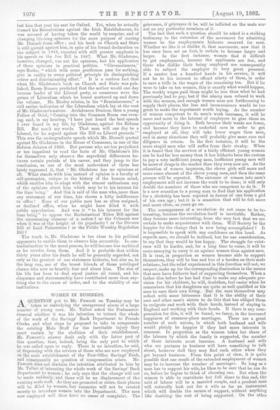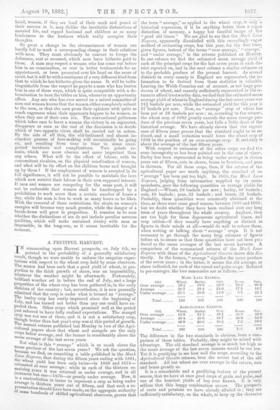WOMEN IN BUSINESS.
AQUESTION put to Mr. Fawcett on Tuesday may be taken as embodying the unexpressed alarm of a large number of young men. Mr. Talbot asked the Postmaster- General whether it was his intention to intrust the whole of the work of the Savings' Bank Department to Female Clerks, and what steps he proposed to take to compensate the existing Male Staff for the inevitable injury they must sustain by the abolition of their establishment. Mr. Fawcett's answer dealt only with the latter part of this question, that, indeed, being the only part to which he was called upon to reply. There is no intention, he said, of dispensing with the services of those who are now employed on the male establishment of the Post-Office Savings' Bank, and consequently no question of compensation arises. Mr. Fawcett does not disclaim the intention attributed to him by Mr. Talbot of intrusting the whole work of the Savings' Bank Department to women ; he only says that the change will not be made suddenly, and there will be no displacement of the existing male staff. As they are promoted or retire, their places will be filled by women, but vacancies will not be created merely to introduce women into the Department. The men now employed will thus have no cause of complaint. The
grievance, if grievance it be, will be inflicted on the male sex/ not on any particular members of it.
The fact that such a question should be asked is a striking testimony to the extension of the movement for admitting women to the employments hitherto reserved for men. Whether we like it or dislike it, that movement, now that it has once been set on foot, is certain to become larger and larger. In the first instance, women find it difficult to get employment, because the applicants are few, and those who dislike their being employed are consequently able to subject the employer to very great pressure. If a master has a hundred hands in his service, it will not be to his interest to offend ninety of them, in order to save a trifle in the wages of the remaining ten. But if he were to take on ten women, this is exactly what would happen. The weekly wages paid them might be less than what he had previously had to pay, but if the ninety men refused to work with the women, and enough women were not forthcoming to supply their places, the loss and inconvenience would be too great to make the experiment worth trying. As the number of women competent to do men's work increases, it will be more and more to the interest of employers to give them an opportunity of doing it. Both because their wants are fewer, and because they have to underbid men in order to get employed at all, they will take lower wages than men, and in many situations they will probably give more care and diligence in return. In the first instance, it will be the more stupid men who will suffer from their rivalry. When it is found that the services of a fairly efficient young woman can be had for less money than it has hitherto been the custom to pay a very inefficient young man, inefficient young men will be more of drugs in the market than they even now are. As the education of women improves, the clever girls will more and more come abreast of the clever young men, and then the same process will be repeated. The entrance of women into men's employment will not increase the work to be done; it will only double the numbers of those who are competent to do it. It is a new sensation to a young man to find that his application for a clerkship has been rejected in favour of one from a girl of his own age ; but it is a sensation that will be felt more and more often, as years go on.
The consequences of a revolution do not cease to be in- teresting, because the revolution itself is inevitable. Rather, they become more interesting, from the very fact that we are certain to make acquaintance with them, Will Society be the happier for the change that is now being accomplished ? It is impossible to speak with any confidence on this head. As regards men, we should be inclined, but for one consideration, to say that they would be less happy. The struggle for exist- ence will be harder, and, for a long time to come, it will be more annoying to carry it on against women than against men. It is true, in proportion as women become able to support themselves, they will be less and less of a burden on their male relations, but the relief experienced in this direction will not, we suspect, make up for the corresponding diminution in the means that men have hitherto had of supporting themselves. When a father dies before he has had time to make any adequate pro- vision for his children, he will, doubtless, feel easier when he remembers that his daughters are quite as well qualified as his eons to earn their own living. But the eons themselves may reflect with some bitterness that it is the ability of their own and other men's sisters to do this that has obliged them to emigrate and work with their hands, instead of staying in England and working with their heads. If there is any com- pensation for this, it will be found, we fancy, in the increased happiness of common-place marriages. There are a great number of such unions, in which both husband and wife would plainly be happier if they had more interests in common. In proportion as the woman takes her share of the labours by which the family is supported, the number of these interests must increase. A husband and wife who are partners in business will have something to talk about, however dull they may find each other when they get beyond business. From this point of view, it is quite possible that one result of the extended employment of women may be to increase the number of marriages. So long as a man has to support his wife, he likes to be sure that he can do so, before he begins to think of choosing one. But when the w6man is able to contribute her full share to this end, the unit of labour will be a married couple, and a prudent man will naturally look out for a wife as for an instrument which will double the means of support, without anything like doubling the cost of being supported. On the other
hand, women, if they are fond of their work and proud of their success in it, may dislike the inevitable distractions of inarried life, and regard husband and children as so many hindrances to the business which really occupies their thoughts.
So great a change in the circumstances of women can hardly fail to work a corresponding change in their relations with men. They must obviously be content to forego the deference, real or assumed, which men have hitherto paid to them. A man may respect a woman who has come out before him in an examination, or sent in better testimonials for an appointment, or been promoted over his head on the score of merit, but it will be with a sentiment of a very different kind from that to which he has hitherto given the name. It will be indis- tinguishable from the respect he pays to a man who has beaten him in one of these ways, which is quite compatible with a de- termination to turn the tables on him, whenever an opportunity offers. Any one who has ever served on a mixed committee of men and women knows that the women either completely submit to the men, or that the men press their opinions with quite as much eagerness when their opponents happen to be women, as when they are of their own sex. The conventional politeness which takes care to leave a woman the victory in an argument, disappears as soon as the end of the discussion is to decide which of two opposite views shall be carried out in action. By the side of all this, the old-fashioned and almost in- stinctive process of love-making will occasionally be going on, and resulting from time to time in some unex- pected incidents and complications. Two points re- main, which are more obscure and more important than any others. What will be the effect of labour, with its concomitant rivalries, on the physical constitution of women, and what will be its effect on the children borne and brought up by them ? If the employment of women is accepted in its full significance, it will not be possible to maintain the laws which now restrict their labour in their own supposed interest. If mon and women are competing for the same post, it will not be endurable that women shall be handicapped by a prohibition to work more than a certain number of hours a day, while the man is free to work as many hours as he likes. With the removal of these restrictions, the strain on women's energies will become very much greater, while the danger of a break-down will grow in proportion. It remains to be seen whether the distinctions of sex do not include peculiar nervous qualities, which will make sustained rivalry with man as impossible, in the long-run, as it seems inevitable for the moment.































 Previous page
Previous page